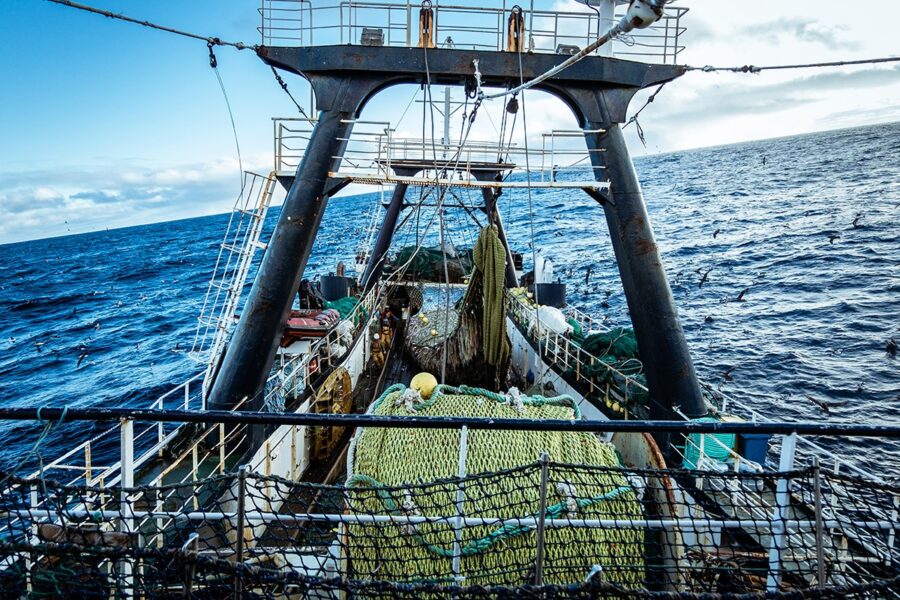Launching their new report – ‘Shifting gears – achieving climate-smart fisheries’ – WWF, the RSPB and the MCS call for a raft of restrictive measures aimed mainly at trawling but also including REM and VMS on all vessels fishing in UK waters.
They say Scotland’s seas and fisheries could play ‘a pivotal role in the fight against the climate and nature crises’.
The report outlines the ‘urgent action’ required to improve the sustainability of the fisheries sector and increase the opportunity for UK seas to act as a ‘vital carbon sink’.
“Scotland’s marine environment is estimated to hold more than the total carbon stored in its land environment such as peatlands, forestry and soils,” say the NGOs.
“Removing fish and using fossil fuels to power boats also contributes to blue carbon impacts and greenhouse gas emissions.”
The report claims that over 50% of UK fishing vessels are around 30 years old, with the vast majority powered by fossil fuels.
“Based on UK fishing vessel activity data, UK fisheries are estimated to have emitted 914.4 kilotons of CO2 over a one-year period, the same as providing the annual energy use of over 110,000 homes.”
Until now, fisheries have been largely ignored in climate negotiations, but in the wake of the recent IPCC report, and ahead of the COP26 climate summit coming to Glasgow in November, this needs to change, say the NGOs.
The conservation organisations are calling on all governments to ‘show global leadership and put the sector on a sustainable footing by adopting a ‘climate- smart’ strategy’.
They say this would include:
• Limiting bottom-towed fishing gear to protect blue carbon within current MPAs and in key areas outside of MPAs
• Working to decarbonise the UK fleet, including removing fuel subsidies and eliminating inefficient fleet structures
• Mandating remote electronic monitoring (REM), with cameras and vessel monitoring systems (VMS) across all vessels fishing in UK waters ‘to deliver increased transparency and traceability across the fishing sector to improve stock health and increase biomass’
• Reducing pressure from heavy bottom-towed fishing gear and reviewing the impact of passive gear use, and whether incentives for gear changes are appropriate • Strengthening overall marine policy frameworks, such as the Scottish government’s Future Fisheries Management Strategy, with a climate change lens that focuses on tackling the climate emergency
• Increasing research and knowledge on blue carbon habitats, stocks, and the fishing sector’s greenhouse gas emissions and blue carbon impact.
“Adopting these recommendations will help futureproof fisheries across the UK by bringing about the recovery of the ocean’s health, and help meet the triple challenge of sustainably feeding a growing population, while staying on track to keep global warming below 1.5°C and reversing biodiversity loss,” say the NGOs.
Mario Ray of WWF Scotland said that while the Scottish government has responsibility for 61% of the UK’s seas, and around 60% of all the UK’s fish is landed in Scotland, its current Future Fisheries Management Strategy ‘fails to clearly set out the role the fishing industry will play in reaching our net zero commitments’.
“If the Scottish government truly wants to maintain its credentials as a climate leader it must leave no stone unturned, and this includes the fisheries sector.”
Alex Kinninmonth of RSPB Scotland said every industry must ‘play a part in driving the rapid decarbonisation and restoration of nature needed to avoid climate breakdown’ and that the report offered ‘a roadmap for fisheries managers to meet climate targets’.
Calum Duncan of the MCS said ‘transformative change’ was needed and that it was ‘crucial for the fisheries sector to move toward net zero engine emissions and much-reduced impact on the seabed and its blue carbon stores’.
This story was taken from the latest issue of Fishing News. For more up-to-date and in-depth reports on the UK and Irish commercial fishing sector, subscribe to Fishing News here or buy the latest single issue for just £3.30 here.








